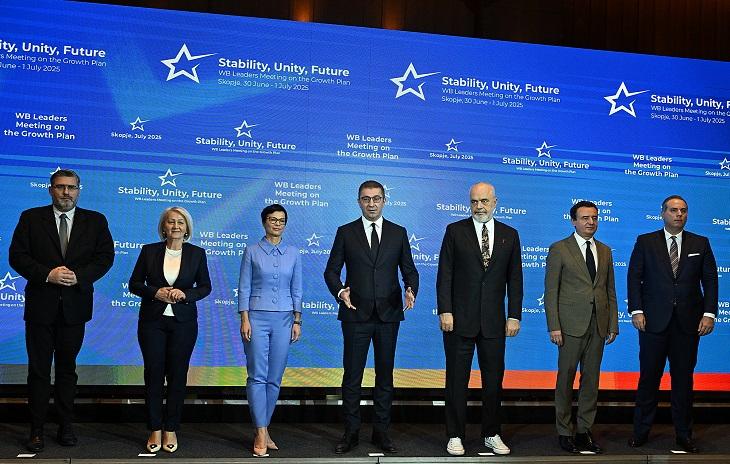Commission adopts 2023 Enlargement package

Commission adopts 2023 Enlargement package
Today, the European Commission adopted the 2023 Enlargement Package, providing a detailed assessment of the state of play and the progress made by Albania, Bosnia and Herzegovina, Kosovo, Montenegro, North Macedonia, Serbia, Türkiye, and for the first time also Ukraine, the Republic of Moldova and Georgia on their respective paths towards accession to the European Union. In particular, the report focuses on the progress in the implementation of fundamental reforms, as well as on providing clear guidance on the reform priorities ahead. Accession is and will remain a merit-based process, fully dependent on the objective progress achieved by each country.
Western Balkans
Progress on EU accession reforms has largely stalled, as Montenegro has suffered from deep polarisation and political instability in the reporting period. The EU welcomes the constitution of the new parliament and the formation of the government, which we expect to swiftly demonstrate its capacity and commitment to Montenegro’s EU path and deliver on EU accession related reforms. Overall, progress is in the accession negotiations will depend on reforms in the area of rule of law (i.e. meeting the interim benchmarks set out in Chapters 23 and 24). Montenegro continues to fully align with the Common Foreign Security Policy.
Serbia continued the implementation of EU accession related reforms, including in the area of rule of law. Serbia started implementing the 2022 constitutional amendments to strengthen the independence of the judiciary and adopted new media legislation. The implementation of the latter can significantly improve the regulatory environment. However, further amendments will be needed to be fully in line with the EU acquis and European standards. Serbia needs to improve, as a matter of priority, its alignment with the EU’s common foreign and security policy, including restrictive measures and statements on Russia. Further work and political commitment are also needed to implement reforms in the area of rule of law. The Commission’s assessment remains that Serbia has technically fulfilled the benchmarks to open cluster 3 (competitiveness and inclusive growth). Serbia must fully cooperate and take all the necessary steps to ensure accountability for the violent attack on Kosovo Police of 24 September and the attack on KFOR on 29 May. On the normalisation of relations with Kosovo, whilst an Agreement was reached in the EU-facilitated Dialogue, both Serbia and Kosovo are yet to start the implementation of their respective obligations, which are binding for the Parties and a key part of their European paths.
In North Macedonia, the authorities have consistently stated that EU accession remains their strategic goal. North Macedonia has continued to fully align with the EU Common Foreign and Security Policy (CFSP). The country has also made some progress in in the area of justice, freedom and security, including the fight against organised crime and the management of migration. As a negotiating country, North Macedonia needs to deliver on the implementation of EU related reforms, including in the judiciary, the fight against corruption and organised crime, public administration reform, including management of public finances, and public procurement. North Macedonia has committed to launch and achieve the relevant constitutional changes as a matter of priority, with a view to include citizens who are part of other people. The screening process of the EU acquis has progressed smoothly, and the authorities have shown a high level of commitment. The Commission presented to Council the screening reports on the “fundamentals cluster” for North Macedonia in July and looks forward to a swift follow up, with a view to opening negotiations on this cluster by the end of the year.
Albania continued to demonstrate its determination to implement EU reforms and to make progress in reforms under the “fundamentals cluster”. Continued full alignment with EU’s CFSP was also a strong signal of the country’s strategic choice of EU accession. Further efforts are needed on freedom of expression, minority issues and property rights, as well as in key areas of the rule of law, such as the fight against corruption and organised crime. The screening process of the EU acquis has progressed smoothly, and the authorities have shown a high level of commitment. The Commission presented to Council the screening reports on the “fundamentals cluster” for Albania in July and looks forward to a swift follow up. It aims to open accession negotiations on cluster 1 (fundamentals) by the end of the year.
In Bosnia and Herzegovina, last year’s candidate status brought a much-needed positive dynamic. A new government has been set up swiftly after elections and has started to deliver on reforms, specifically through the amendments introducing integrity checks in the judiciary. Yet, further efforts are needed. This includes adopting important rule of law and judicial reforms and moving forward with constitutional and electoral reforms, which are of utmost priority to ensure equal rights for all citizens. It is also important to preserve the constitutional order of the country. The secessionist and authoritarian measures introduced in the Republika Srpska entity are not in line with the EU path. Further efforts are required for Bosnia and Herzegovina to fulfil the key priorities set out in the Commission’s Opinion on its member application. Therefore, the Commission recommends the opening of EU accession negotiations with Bosnia and Herzegovina, once the necessary degree of compliance with the membership criteria is achieved.
Kosovo remained committed to its European path. It continued to voluntarily fully align with the EU’s CFSP, including on condemnation of Russia’s war of aggression against Ukraine and to adopt restrictive measures against it. The reporting period witnessed legislative achievements, including an important electoral reform. However, more work needs to be done, including on the action plan on justice reforms. On 1 January 2024, visa liberalisation for Kosovo will enter into force. The situation in the north of Kosovo has been affected by several crises, the latest one being the violent attack against Kosovo police on 24 September 2023. On the normalisation of relations with Serbia, whilst an Agreement was reached in the EU-facilitated Dialogue, both Kosovo and Serbia are yet to start the implementation of their respective obligations, which are binding for the Parties and a key part of their European paths.
Next steps
It is now for the Council to consider today’s recommendations of the Commission and take decisions on the steps ahead in the enlargement process.
Source: European Union
Photo credits: European Union



